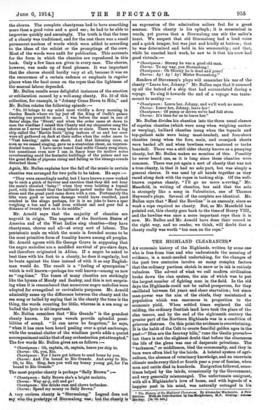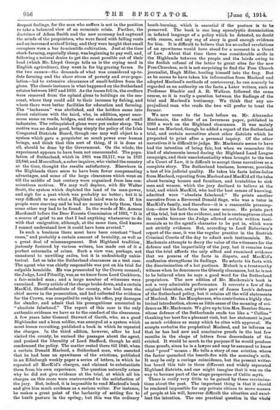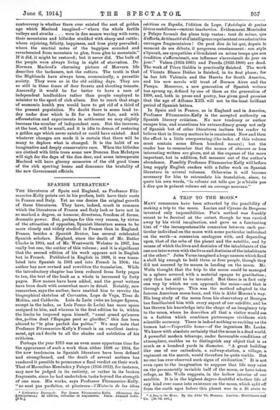THE HIGHLAND CLEARANCES.•
AN economic history of the Highlands, written by some one who is free from bias and who understands the meaning of evidence, is a much-needed undertaking, for the changes of the past two centuries involve so many complex factors that the ordinary partisan sketch in snow or in ink is entirely valueless. The advent of what we call modern civilization broke down the clan system, the aim of which was to put the largest number• of fighting men in the field. In the old days the Highlands could not be called prosperous, for they oscillated between fat years and sheer starvation ; but since man-power was the aim of the chiefs, they maintained a population which was enormous in proportion to the economic yield. When settled times replaced the old raiding, the ordinary Scottish land laws took the place of the clan tenure, and by the end of the eighteenth century the greater part of the. Northern Highlands was in a condition of grievous distress. On this point the evidence is overwhelming. It is the habit of the Celt to create fanciful golden ages in the past—" Blue are the faraway hills," runs the Gaelic proverb—. but there is not the slightest doubt that before the clearances the life of the glens was one of desperate privations. The " tacksmen," or middlemen, bled the commonalty, and they in turn were often bled by the lairds. A belated system of agri- culture, the absence of veterinary knowledge, and an uncertain climate made every third or fourth year a year of famine, when men and cattle died in hundreds. Emigration followed, some- times helped by the lairds, occasionally by the Government, and very generally mismanaged. The unfortunate emigrant, with all a Highlander's lova of home, and with legends of a happier peat in his mind, was naturally outraged in his • The History o' the Highland Cltarancsc By Aleanclor Mackenzie. A New edition. wttnaaIalsocluCtlan by lanXximbevion, litubag AonenO Afisckayl• (2ii• 6+ net.J deepest feelings, for the man who suffers is not in the position to take a balanced view of an economic crisis. Further, the doctrines of Adam Smith and the new economy had captured the minds of the proprietors, who were faced with falling rents and an increased scale of living, and they were taught that small occupiers were a bar to scientific cultivation. Just at the time stock-farming, especially sheep, was beginning to pay well, and, following a natural desire to get the most possible out of their land (which Mr.Lloyd George tells us is the crying need in English agriculture), they went in for big grazing farms. So the two causes—the demands of what was considered up-to- date farming and the sheer stress of poverty and over-popu- lation—led to extensive clearances of small-holders from the glens. The classic instance is what happened on the Sutherland estates between 1807 and 1820. As the leases fell in, the crofters were removed from the upland glens to holdings on the sea- coast, where they could add to their incomes by fishing, and where there were better facilities for education and farming. The " tacksman" was abolished, and the holders came into direct relations with the laird, who, in addition, spent enor- mous sums on roads, bridges, and the establishment of small industries. The relinquished glens were put under sheep. The motive was no doubt good, being simply the policy of the Irish Congested Districts Board, though one may well object to a system which gave a proprietor so much power over human beings, and think that this sort of thing, if it is done at all, should be done by the Government. On the whole, the experiment appears to have been not unsuccessful. The popu- lation of Sutherland, which in 1801 was 23,117, was in 1821 23,846, and Macculloch, a sober inquirer, who visited the country at the time, thought the results satisfactory. Elsewhere in the Highlands there seem to have been fewer compensating advantages, and some of the large clearances which went on till the middle of last century were organized from less con- scientious motives.. We may well deplore, with Sir Walter Scott, the system which depleted the land of its man-power, and sigh for a past which was probably no better ; but it is very difficult to see what a Highland laird was to do. If his people were starving and he had no money to help them, then some other way had to be found. In the words of Mr. Aeneas Macdonell before the Deer Forests Commission of 1892, "It is a source of grief to me that I had anything whatsoever to do with that emigration, although, at the same time, God knows I cannot understand how it could have been averted."
In such a business there must have been constant "hard cases," and probably a certain amount of brutality, as well as a great deal of mismanagement. But Highland tradition, jealously fostered by various writers, has made out of it a perfect saturnalia of crime. Such a view was, perhaps, not unnatural to unwilling exiles, but it is undoubtedly unhis- torical Let us take the Sutherland clearances as a test ease. The agent who was chiefly responsible was put on his trial for culpable homicide. He was prosecuted by the Crown counsel; the Judge, Lord Pitmilly, was, as we know from Lord Cockburn, a fair-minded man; and a large number of witnesses were examined. Every article of the charge broke down, and a certain MacKid, Sheriff-substitute of the county, who had been the chief mover in the prosecution, and bad collected the evidence for the Crown, was compelled to resign his office, pay damages for slander, and admit that his precognitions amounted to "absolute falsehood." The report of this case is the only authentic evidence we have as to the conduct of the clearances. A few years later General Stewart of Garth, who, as a good Highlander and a keen soldier, was annoyed at a system which must lessen recruiting, published a book in which be repeated
the charges. the third edition, however, after he had visited the county, he excised the passages about the agent, and praised the liberality of Lord Stafford, though he still condemned the policy. The matter rested there till 1840, when a certain Donald Macleod, a Sutherland man, who asserted that he had been an eyewitness of the evictions, published in an Edinburgh weekly paper a series of letters, in which be repeated all MacKid's charges, and claimed to substantiate them from his own experience. The question naturally arises why he did not give evidence at the trial, at which all his charges on this score were controverted to the satisfaction of the jury. But indeed, it is impossible to read Macleod's book and give him much credence as a serious writer. For instance, he makes a great point of the barbarity of setting fire to the heath pasture in the spring; but this was the ordinary heath-burning, which is essential if the pasture is to be preserved. The book is one long apocalyptic denunciation in inflated language of a policy which he detested, no doubt with reason, and any rag of story is good enough evidence for him. It is difficult to believe that his so-called revelations of an eyewitness would have stood for a moment in a Court of Law. About that time there was considerable strife in the Highlands between the people and the lairds owing to the foolish refusal of the latter to grant sites for the new Free Churches, so it is not surprising to find the Free Church journalist, Hugh Miller, hurling himself into the fray. But as he seems to have taken his information from Macleod and adopted Macleod's methods of controversy, he can scarcely be regarded as an authority on the facts., Later writers, such as Professor Blackie and A. It: Wallace, followed the same course, so it is really a question between the findings of the trial and Macleod's testimony. We think that any tin. prejudiced man who reads the two will prefer to trust the former.
We now come to the book before us. Mr. Alexander Mackenzie, the editor of an Inverness paper, published in 1883 a work on the Highland clearances. It was mainly based on Macleod, though he added a report of the Sutherland trial, and certain narratives about other districts which he purported to print after a personal inquiry. Of the other narratives it is difficult to judge. Mr. Mackenzie seems to have had the intention of being fair, but when we remember the kind of statements issued during the Highland Land League campaign, and their unsubstantiality when brought to the test of a Court of Law, it is difficult to accept these narratives as a complete story. The Sutherland business, however, provides a test of his judicial quality. He takes his facts holus-bolus from Macleod, repeating from Macleod and MacKid all the tales about burning houses and furniture, and brutalities to sick men and women, which the jury declined to believe at the trial, and which MacKid, who had the best means of knowing, admitted were "absolute falsehood." He prints another narrative from a Reverend Donald Sage, who was a tutor in MacKid's family, and therefore—it is a reasonable presump- tion—drew his facts from the same source. He prints part of the trial, but not the evidence, and he is contemptuous about its results because the Judge allowed certain written testi- monials as to the agent's character to be put in, which were not strictly evidence. But according to Lord Robertson's report of the case, it was the regular practice in the Scottish Criminal Courts of the day to admit such testimonials. Mr. Mackenzie attempts to decry the value of the witnesses for the defence and the impartiality of the jury, but it remains true that the trial affords the only sifted and examined evidence that we possess of the facts in dispute, and MacKid's confession strengthens its findings. He selects his facts with the discrimination of a hot partisan. Mulook is a trustworthy witness when he denounces the Glenelg clearances, but he is not to be believed when be says a good word for the Sutherland proprietors. The new edition of Mr. Mackenzie's book is not a very admirable performance. It corrects a few of the original blemishes, and prints part of James Loch's defence of the Sutherland policy, but it retains all the wild statements of Macleod. Mr. Ian Macpherson, who contributes a highly rhe- torical introduction, shows as little sense of the meaning of evi- dence as Mr. Mackenzie. We give up to him Mrs. Beecher Stowe whose defence of the Sutherlands reads too like a " Collins " thanking her host for a pleasant visit, but her statement is jest as much evidence as many which he cites with approval. He accepts verbatim the prophetical Macleod, and he informs ue that he has had new and conclusive proofs in the last few months in the shape of letters from descendants of the evicted. It would be much to the purpose if he would produce these proofs, since he is a lawyer and may be assumed to know what "proof " means.. He tells a story of one eviction where the factor quenched the hearth-fire with the morning's milk. It may be only a curiops coincidence, but the present writer. has heard this tale in three different and widely separated Highland districts, and one might imagine that it was on the way to become part of the stage-properties of Celtic myth.
There is really very little to be gained by these recrimina- tions about the past. The important thing is that it should be rendered impossible for any private citizen to move masses of people at his will, however difficult the situation and excel- lent the intention. The one practical question in the whole
controversy is whether there ever existed the sort of golden age which Macleod imagined—" where the whole fertile valleys and straths . . . were in due season waving with corn; their mountains and hillsides studded with sheep and cattle; where rejoicing, felicity, happiness, and true piety prevailed; where the martial notes of the bagpipes sounded and reverberated from mountain to glen, from glen to mountain." If it did, it might be restored ; but it never did. The bulk of the people were always living in sight of starvation. Dr. Norman Maeleas charming picture of Morvern life describes the tacksmen, not the cotters. The truth is that the Highlands have always been, economically, a parasitic society. They were so in the old raiding days. They are ao still in these times of deer forests and shooting tenants. Assuredly it would be far better to have a race of independent landholders rather than people employed to minister to the sport of rich aliens. But to reach that stage of economic health you would have to get rid of a third of the present population. No doubt there is some land to- day under deer which is fit for a better fate, and with afforestation and experiments in settlement we may slightly increase the number of independent men. But the increase, at the best, will be small, and it is idle to dream of restoring a golden age which never existed or could have existed. And whatever changes are made it is certain that there will be many to deplore what is changed. It is the habit of an imaginative and deeply conservative race. When the hillsides are clothed with little trees some new Duncan Ban McIntyre will sigh for the days of the dun deer, and some intemperate Macleod will have gloomy memories of the old good times of the rich sporting lessee and denounce the brutality of the new Government officials.












































 Previous page
Previous page